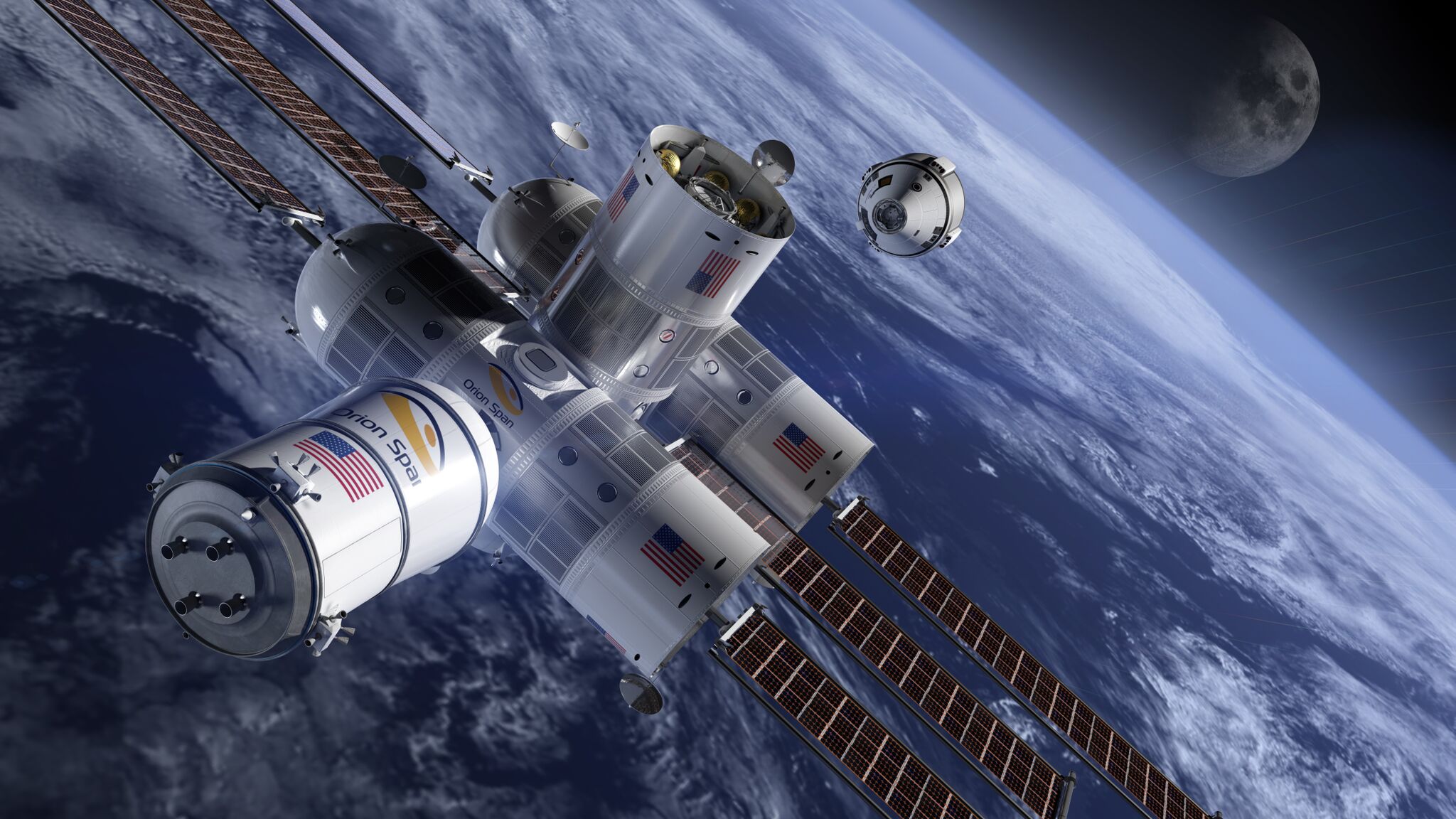What is Orion Span?
Orion Span was an aerospace startup based in Silicon Valley, California, founded by Frank Bunger, a veteran technology executive and serial entrepreneur with extensive experience in building early-stage companies. The company initially gained attention with ambitious plans to create Aurora Space Station, which was touted as the world’s first luxury space hotel. Bunger envisioned more than just a hotel; the company aimed to offer full charters to space agencies for human spaceflight, zero gravity research, and in-space manufacturing at a fraction of traditional costs.
Orion Span’s architecture was designed for scalability, allowing it to expand its capacity in orbit much like a growing city on Earth. The long-term vision included selling dedicated space modules as the world’s first space condominiums, where owners could live, visit, or even sublease their units.
The company also positioned the Aurora Space Station as the first in a series of space travel destinations, expecting that as launch capabilities improved and became more frequent, costs would decrease, creating a sustainable commercial space ecosystem.
However, despite its ambitious goals, Orion Span ceased operations before these plans could come to fruition. The company faced significant challenges in bringing the Aurora Space Station to life, and as of early 2023, the project was officially abandoned. The dream of a luxury space hotel, for now, remains unrealised.
Table of contents
What happened to the Aurora Space Station?
The Aurora Space Station, which was planned to be the world’s first luxury space hotel, was an ambitious project launched by Orion Span. The station was intended to provide a unique experience for wealthy tourists and offer facilities for zero-gravity research and in-space manufacturing. It was also supposed to be scalable, with future plans to sell space condominiums where owners could live, visit, or sublease their units.
However, the project faced significant challenges, including the immense technical, financial, and logistical hurdles associated with building and maintaining a private space station. Despite the initial excitement and attention the project garnered, Orion Span was unable to secure the necessary funding and partnerships to move forward. By early 2023, it became clear that the Aurora Space Station project would not be realised, and Orion Span ultimately ceased operations. The ambitious dream of a space hotel, for now, remains unfulfilled, with the Aurora Space Station joining a list of unrealised space tourism ventures.
Future-proof your hotel with SiteMinder Adapt, thrive, and secure your hotel's future with the world's leading platform designed to boost revenue and efficiency.
The concept of Aurora Station: a revolutionary idea
When you run a hotel, it can be hard enough to keep on top of your competition down here on Earth. But not long ago, a new hotel aimed to make a play for ultimate bragging rights by opening in space. The Aurora Space Station, developed by Orion Span Inc., was set to orbit its guests around the globe 16 times each day, offering a unique experience where travellers could witness a sunrise and sunset every 90 minutes from 200 miles above the Earth’s surface.
So, what were the ins and outs of this huge development? Surely there was a catch. Well, the $9.5 million reservation fee was certainly one.
Let’s take a look at what travellers were expecting during their stay at what was once touted as the world’s first space hotel.
When will Aurora Station launch and who can stay there?
Named after the Aurora lights that dazzle the Earth’s polar skies, the hotel was first announced during the Space 2.0 Summit in San Jose, California. It was due to be launched in 2021 and planned to check in its first guests in 2022. The trip would have spanned 12 days, offering four travellers at a time (and two crew members) the experience of a lifetime.
The first four months of travel, requiring $80,000 deposits, had already sold out—though the total cost of $9.5 million still needed to be covered. The space hotel even accepted booking payments via cryptocurrency. While the price tag was hefty, it was significantly lower than the early estimations of between $20 and $40 million per guest.
Those who secured a reservation were set to undergo a three-month Orion Span Astronaut Certification program, preparing them for space travel. Training would have included basics such as eating and using the bathroom in space, with further training at the company’s Texas headquarters, and on-the-job training aboard the Aurora Space Station.
What will the Aurora Station look like?
The hotel was designed to be about the size of a large private jet cabin. Measuring 13.3 by 4.3 metres, with a pressurised volume of 160 cubic metres, Aurora was billed as a cosy yet comfortable space for guests, though much smaller than the International Space Station, which is 109 metres long with an internal pressurised volume of 916 cubic metres.
High-speed internet was to be one of the biggest priorities to ensure guests could share their hotel experience with friends and family back on Earth. Meanwhile, food was expected to be a middle ground between the average astronaut diet and Earth cuisine, given that cooking in zero gravity is extremely dangerous.
However, despite all the excitement and detailed planning, Orion Span ceased operations, and the Aurora Space Station never made it off the ground. The ambitious dream of the world’s first space hotel, for now, remains unfulfilled.

Space hotels like Aurora Station by Orion Span
Emerging space hotel projects
Emerging space hotel projects are capturing imaginations and paving the way for an entirely new frontier in luxury travel. Here are some of the most notable projects currently in development:
Voyager Station by Orbital Assembly Corporation
The Voyager Station, developed by Orbital Assembly Corporation, is one of the most ambitious space hotel projects in the works. Set to open as early as 2027, this rotating space station aims to provide an extraordinary experience by simulating gravity for its guests. The station, which will orbit the Earth, is designed to accommodate up to 280 guests and 112 crew members, offering amenities that rival those of luxury hotels on Earth, including restaurants, a health spa, gyms, and even themed restaurants and bars. Voyager Station’s modular design also allows for various entertainment and recreational activities in space, making it more than just a place to sleep—it’s a full-fledged space resort.
Orbital Reef by Blue Origin and Sierra Space
Another significant project is Orbital Reef, a commercial space station being developed by Blue Origin, Jeff Bezos’s aerospace company, in partnership with Sierra Space. Orbital Reef is envisioned as a “mixed-use business park” in space, with facilities that can be adapted for different purposes, including space tourism. Although it’s not strictly a hotel, Orbital Reef plans to include luxury accommodations for tourists, along with research and manufacturing facilities. The project aims to be operational by the late 2020s and will offer a unique blend of tourism, research, and business opportunities in space.
The future of space tourism
Axiom Space Station
Axiom Space is working on what could become the first commercial space station. Initially, Axiom plans to attach its modules to the International Space Station (ISS) by 2024, but eventually, these modules will separate to form a fully independent commercial space station. Axiom’s station will feature luxurious accommodations designed by Philippe Starck, offering space tourists a high-end experience in orbit. The station will also serve as a hub for research, manufacturing, and other commercial activities, making it a versatile platform in space.
As the future of space tourism unfolds, the possibilities are both thrilling and expansive. Ambitious projects and technological advancements are steadily transforming the dream of space travel into a tangible reality.
One of the most promising frontiers is the creation of luxury space hotels. Companies like Orbital Assembly Corporation are spearheading efforts to build rotating space stations that simulate gravity, offering an unparalleled experience of life in orbit. These innovations are not just about tourism; they are laying the groundwork for human habitats in space, bringing us closer to the idea of living beyond Earth.
Investing in space tourism also opens doors to collaborations with established aerospace giants. Partnerships with these firms could accelerate the development of space hotels and other tourism ventures, making the final frontier more accessible than ever before.

